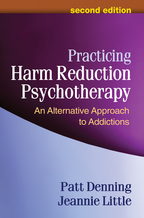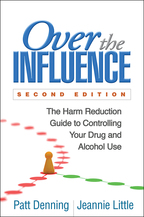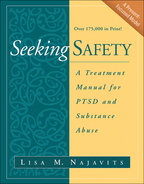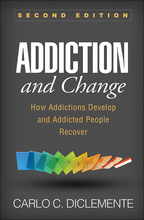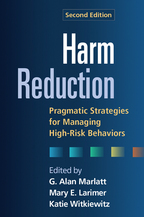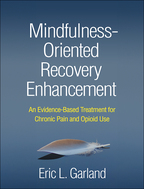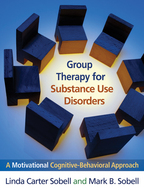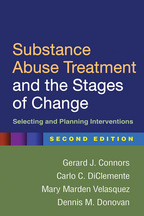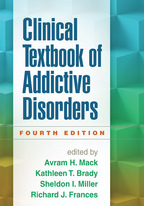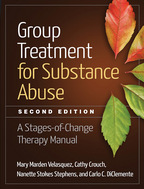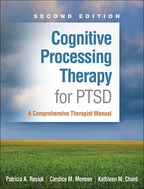Practicing Harm Reduction Psychotherapy
Second Edition
An Alternative Approach to Addictions
Patt Denning and Jeannie Little
HardcoverPaperbacke-bookprint + e-book
Hardcover
orderOctober 24, 2011
ISBN 9781462502332
Price: $60.00 366 Pages
Size: 6" x 9"
Paperback
orderMarch 26, 2024
ISBN 9781462554966
Price: $40.00366 Pages
Size: 6" x 9"
Sign up for emails on upcoming titles on Addictions (with special discounts)!
“This is a great book that has radical reform implications for treating drug users.”

—American Journal of Psychiatry
“This well-written book....[would be] useful in training graduate students in the integration of addictions treatment into everyday clinical practice—a useful skill to possess given the high rates of addictive disorders in the general population.”

—Journal of Studies on Alcohol
“Accessible to a wide array of practitioners....[Combines] discussion of research and theory with clinical case application....The book delivers on its promise of presenting an approach that is an alternative to the status quo in American SUDs treatment services.”

—Clinical Psychology Review
“An essential tool for the modern practitioner who treats any patient using drugs.”

—Addiction
“The real strength in this book lies in its optimism that it is possible to treat 'extremely damaged individuals'...the principle of excluding no-one from treatment is most welcome.”

—Alcohol and Alcoholism
“Introduces the reader to a new and innovative way to view addictions and provides a nontraditional approach to the treatment of individuals with substance abuse difficulties....A must read for all mental health and substance abuse practitioners.”

—Canadian Journal of Counselling
“This pioneering book presents an integrated, realistic psychotherapeutic approach for individuals with substance use problems. The second edition develops the treatment model in great detail and provides a wide range of valuable harm reduction resources—for example, guidelines for combining psychotherapy with medication for patients with serious comorbidity. An excellent practical reference for general mental health practitioners and addiction specialists.”

—Linda C. Sobell, PhD, ABPP, President's Distinguished Professor, and Mark B. Sobell, PhD, ABPP, President's Distinguished Professor, College of Psychology, Nova Southeastern University
“The substance abuse treatment community in the United States ignored this evidence-based approach for way too long. This important book shows how practitioners can treat clients at the precise point where they are capable of making changes. It features examples, case studies, and valuable information on applying harm reduction principles in group work, supervision, and other contexts, in addition to individual psychotherapy. This is a 'must read' for anyone in the field of addictive disorders.”

—Robert J. Meyers, PhD, Emeritus Research Associate Professor of Psychology, University of New Mexico; Director, Robert J. Meyers, PhD, and Associates
“The second edition of Practicing Harm Reduction Psychotherapy is a book whose time has come. Harm reduction is finally recognized as a basic concept that needs to inform the treatment of all clients with substance use problems, particularly those who have co-occurring disorders. Denning and Little clearly position harm reduction as a current, integrated, nondogmatic, client-centered treatment approach.”

—Shulamith Lala Ashenberg Straussner, PhD, LCSW, Silver School of Social Work, New York University
“Denning and Little have earned an international reputation for their research and clinical practice. Highlighting the principle of 'doing patients no harm,' the authors explain the theoretical background of harm reduction psychotherapy and describe how to conduct it. The book is packed with vivid, intriguing examples. I recommend it to a broad readership of mental health professionals and students.”

—Hendrik G. Roozen, PhD, Novadic-Kentron Treatment Services and Erasmus University Medical Center, The Netherlands
—American Journal of Psychiatry
“This well-written book....[would be] useful in training graduate students in the integration of addictions treatment into everyday clinical practice—a useful skill to possess given the high rates of addictive disorders in the general population.”
—Journal of Studies on Alcohol
“Accessible to a wide array of practitioners....[Combines] discussion of research and theory with clinical case application....The book delivers on its promise of presenting an approach that is an alternative to the status quo in American SUDs treatment services.”
—Clinical Psychology Review
“An essential tool for the modern practitioner who treats any patient using drugs.”
—Addiction
“The real strength in this book lies in its optimism that it is possible to treat 'extremely damaged individuals'...the principle of excluding no-one from treatment is most welcome.”
—Alcohol and Alcoholism
“Introduces the reader to a new and innovative way to view addictions and provides a nontraditional approach to the treatment of individuals with substance abuse difficulties....A must read for all mental health and substance abuse practitioners.”
—Canadian Journal of Counselling
“This pioneering book presents an integrated, realistic psychotherapeutic approach for individuals with substance use problems. The second edition develops the treatment model in great detail and provides a wide range of valuable harm reduction resources—for example, guidelines for combining psychotherapy with medication for patients with serious comorbidity. An excellent practical reference for general mental health practitioners and addiction specialists.”
—Linda C. Sobell, PhD, ABPP, President's Distinguished Professor, and Mark B. Sobell, PhD, ABPP, President's Distinguished Professor, College of Psychology, Nova Southeastern University
“The substance abuse treatment community in the United States ignored this evidence-based approach for way too long. This important book shows how practitioners can treat clients at the precise point where they are capable of making changes. It features examples, case studies, and valuable information on applying harm reduction principles in group work, supervision, and other contexts, in addition to individual psychotherapy. This is a 'must read' for anyone in the field of addictive disorders.”
—Robert J. Meyers, PhD, Emeritus Research Associate Professor of Psychology, University of New Mexico; Director, Robert J. Meyers, PhD, and Associates
“The second edition of Practicing Harm Reduction Psychotherapy is a book whose time has come. Harm reduction is finally recognized as a basic concept that needs to inform the treatment of all clients with substance use problems, particularly those who have co-occurring disorders. Denning and Little clearly position harm reduction as a current, integrated, nondogmatic, client-centered treatment approach.”
—Shulamith Lala Ashenberg Straussner, PhD, LCSW, Silver School of Social Work, New York University
“Denning and Little have earned an international reputation for their research and clinical practice. Highlighting the principle of 'doing patients no harm,' the authors explain the theoretical background of harm reduction psychotherapy and describe how to conduct it. The book is packed with vivid, intriguing examples. I recommend it to a broad readership of mental health professionals and students.”
—Hendrik G. Roozen, PhD, Novadic-Kentron Treatment Services and Erasmus University Medical Center, The Netherlands

